

Five Methods To Get Students Asking Essential Questions. The 40 Reflection Questions. Should I teach problem-, project-, or inquiry-based learning? SmartBlogs. Lately, there have been a bunch of buzzwords floating around the education world that all seem to mean the same thing.
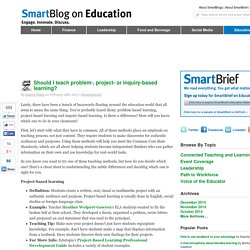
Questioning - Top Ten Strategies. “Learn from yesterday, live for today, hope for tomorrow.
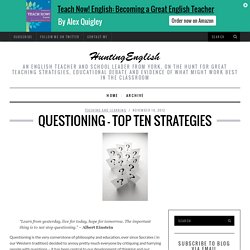
The important thing is to not stop questioning.” – Albert Einstein. 8 Strategies To Help Students Ask Great Questions. 8 Strategies To Help Students Ask Great Questions by Terry Heick Questions can be extraordinary learning tools.
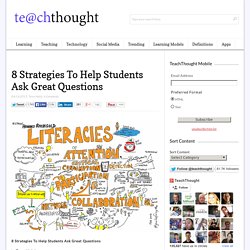
A good question can open minds, shift paradigms, and force the uncomfortable but transformational cognitive dissonance that can help create thinkers. 8 ways teachers can talk less and get kids talking more. If you do fewer teacher-directed activities, that means the kids will naturally do more talking, doesn’t it?

Not necessarily. I have often found myself talking almost constantly during group work and student-directed projects because I’m trying to push kids’ thinking, provide feedback, and help them stay on task. Even when the learning has been turned over to the students, it’s still tempting to spend too much time giving directions, repeating important information, and telling students how they did instead of asking them to reflect on their work. Here are 8 ways teachers can talk less and get students talking more: 1. Who Wants to Know? Use Student Questions to Drive Learning. Martin Luther King, Jr. considered this to be life's most persistent and urgent question: "What are you doing for others?
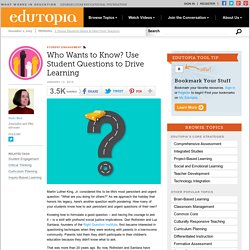
" As we approach the holiday that honors his legacy, here's another question worth pondering: How many of your students know how to ask persistent and urgent questions of their own? Knowing how to formulate a good question -- and having the courage to ask it -- is a skill with profound social justice implications. Dan Rothstein and Luz Santana, founders of the Right Question Institute, first became interested in questioning techniques when they were working with parents in a low-income community.
Parents told them they didn't participate in their children's education because they didn't know what to ask. The Question Game: A Playful Way To Teach Critical Thinking. The Question Game by Sophie Wrobel, geist.avesophos.de The Question Game: A Playful Way To Teach Critical Thinking Big idea: Teaching kids to ask smart questions on their own A four-year-old asks on average about 400 questions per day, and an adult hardly asks any.
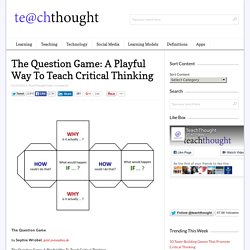
Our school system is structured around rewards for regurgitating the right answer, and not asking smart questions – in fact, it discourages asking questions. In A More Beautiful Question: The Power of Inquiry to Spark Breakthrough Ideas, Warren Berger suggests that there are three main questions which help in problem solving: Why questions, What If questions, and How questions. Regardless of the question, the question needs to be phrased openly and positively in order to achieve positive results – a closed or negative question only raises bad feelings against each other. 38 Question Starters based on Bloom’s Taxonomy - Curriculet.
Curriculet is free for teachers and students.
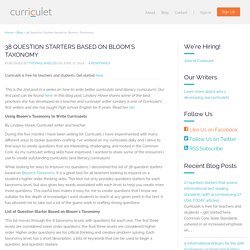
Get started here. This is the 2nd post in a series on how to write better curriculets (and literacy curriculum). Our first post can be found here. In this blog post, Lindsey Howe shares some of the best practices she has developed as a teacher and curriculet writer. Lindsey is one of Curriculet’s first writers and she has taught high school English for 8 years. Thought Questions - Asking the right questions is the answer. 5 Powerful Questions Teachers Can Ask Students. My first year teaching a literacy coach came to observe my classroom.
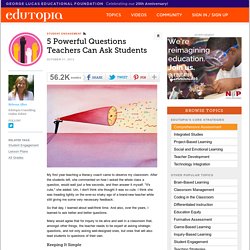
After the students left, she commented on how I asked the whole class a question, would wait just a few seconds, and then answer it myself. "It's cute," she added. Um, I don't think she thought it was so cute. I think she was treading lightly on the ever-so shaky ego of a brand-new teacher while still giving me some very necessary feedback. So that day, I learned about wait/think time. Questioning, Listening and Responding - C. Roland Christensen Center for Teaching and Learning. It would be hard to name a more valuable pedagogical accomplishment than the mastery of questioning, listening, and response: three teaching skills as linked, though distinct, as the panels of a triptych.
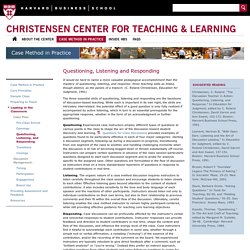
(C. Roland Christensen, Education for Judgment, 1991) The three essential skills of questioning, listening and responding are the backbone of discussion-based teaching. While each is important in its own right, the skills are intricately interrelated: the potential effect of a good question is only fully realized if accompanied by active listening, which in turn is an essential prerequisite for the appropriate response, whether in the form of an acknowledgment or further questioning. Questioning Experienced case instructors employ different types of questions at various points in the class to shape the arc of the discussion toward student discovery and learning. Questioning Strategies. Planning questions Effective questioning sessions in classroom require advance preparation.
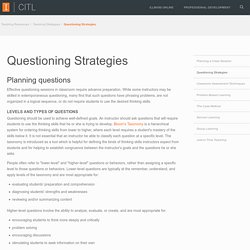
How do you react to student answers in class? [[AAPT Session: Effects of variation of faculty practice on student perceptions, Chandra Turpen]] Many faculty and high school teachers use some form of peer instruction or student response system (like clickers) as promoted by Eric Mazur, but they’re used in a huge variety of ways in the classroom.